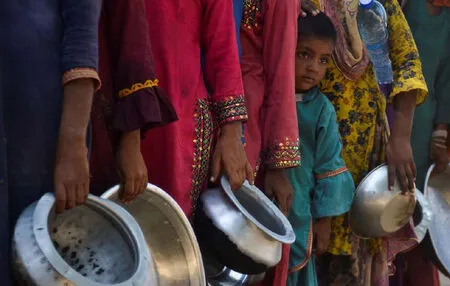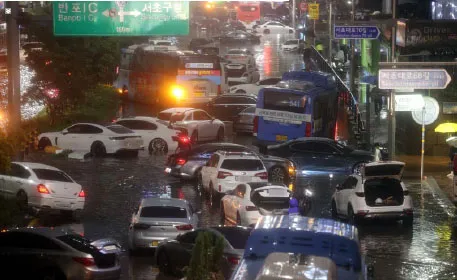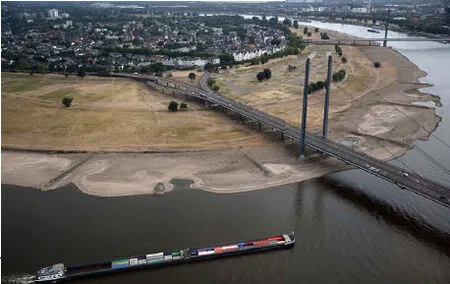A Disturbing Economic Variable
By Qiu Hui

flooding in many parts of Pakistan on September 20,2022.This picture shows victims queuing for relief food.(XINHUA)
The serious impact of climate change on the world economy cannot be ignored
Climate change is rapidly becoming a disturbing variable affecting global economic performance.How urgent are climate-related issues?This summer,record high temperatures were reported in many parts of the world including East Asia,Europe,and the North Pole.Consequently,the existing global crises of food security and energy supply have become even more pressing.
According to an overwhelming majority of experts,the problem of climate change caused by global warming has become an irreversible trend today.In the future,extreme weather will be the new normal.Without countermeasures,global economic growth will face severe challenges.
Europe’s Energy Crisis
Last July,record-high temperatures hit many parts of the world including Europe,Africa,Asia,North America,and the North Pole.In Europe,the effects of extreme weather seemed to be more evident.In July,the United Kingdom,which is well-known for its mild climate,issued its first red alert for abnormally high temperatures since the beginning of meteorological records in this country.A month later,with high temperatures and little rainfall,the British government declared a status of drought in eight of the 14 areas of England.Alongside the UK,other countries in Western,Southern,and Central Europe also suffered from varying degrees of drought due to insufficient rainfall.
On July 18,the Joint Research Center of the European Commission released a report declaring that nearly half of the territories of the EU and the UK were facing risk of drought.The European Commission has predicted that,due to dry weather,the total production of cereal crops such as wheat,barley,and corn would fall by 2.5 percent from last year.
In addition,the interwoven impact of COVID-19 and geopolitical conflicts have hit the European energy market hard.Data from relevant agencies show that in the first seven months of this year,Europe’s hydropower generation fell by 20 percent and nuclear power generation fell by 12 percent year on year.
Li Xiang,an associate researcher at the Energy Research Institute of Peking University,said that under the impact of high temperatures,water levels of many European rivers fell sharply,which reduced the cooling water supply for coalfired and nuclear power plants.Insufficient cooling resulted in decreased efficiency of power generation.
“The drought will have an impact on all aspects of the European economy,” predicted Li.When high temperatures break certain limits,photovoltaic power generation will also get restrained to a certain extent.For the manufacturing industry,which consumes a large amount of electricity,the inevitable consequence is a decline in production capacity.
The UN Office for Disaster Risk Reduction reported in “The Human Cost of Disasters 2000-2019” that the last twenty years brought 7,348 major disasters around the world affecting a total of 4.2 billion people,and causing economic losses of US$2.97 trillion,far surpassing the 4,212 major natural disasters between 1980 and 1999.The increase in extreme weather events is considered the main cause of the sharp increase in natural disasters.
“The serious impact of climate change on the world economy cannot be ignored,” many climate change experts have stressed.In the context of global warming,extreme weather is no longer a“once in a century” probabilistic event,but already the new normal.
The global climate is abnormal,and the extreme summer temperatures have exacerbated people’s concerns about winter,said Li.In Europe,winter is always the peak season for heating and power consumption.With the increasing demand for energy,energy prices will soar.Although the main factor behind Europe’s current energy crisis is the conflict between Russia and Ukraine,extreme weather events will “add frost to the snow”covering its energy market.
‘Fragile’ Emerging Economies
20%
12%
Data from relevant agencies show that in the first seven months of this year,Europe’s hydropower generation fell by20 percentand nuclear power generation fell by12 percentyear on year.
The real economy is going to be the first to be affected by climate change.Sun Tianyin,deputy director of the Center for Green Finance Research of the National Institute of Financial Research at Tsinghua University,has been engaged in research on climate risk and opportunity analysis.He thinks that climate change affects the economy and society through two main channels.The first are short-term events including the disastrous events resulting from climate change and temperature rise such as typhoons,floods,and drought,which have taken place more frequently and with more destructive power.These climate hazards can lead to the interruption of business operations and physical property losses and leave a negative impact on the necessary links in economic activities such as real assets,business operations,and supply chains,causing economic losses.
The second channel is the long-term persistent impact.For example,rising global average temperatures have led to lower grain production and lower labor productivity,and the sea level rise can have a long-term impact on property and population in coastal areas.Both the short-term events and long-term persistent impact of climate change will cause damage to the real economy and spread risks to the financial system.
Sun explained that when the real economy is affected by climate hazards,operating costs increase while revenues decrease,causing profits to decrease accordingly.Eventually,the financial performance of businesses will deteriorate as their ability to repay loans weakens,resulting in credit risk.If businesses are affected by climate hazards for a long time in the future,their cash flow will be weakened,leading to reduced corporate valuation and market risks.For insurance companies,the increased loss of real assets due to climate hazards will challenge the traditional pricing model of insurance based on historical data and lead to more frequent insurance claims.

European Commission leaders announce a package of climate change measures at a press conference in Brussels,Belgium,on July 14,2021.(ZHANG CHENG)
In September 2021,the World Meteorological Organization released the Atlas of Mortality and Economic Losses from Weather,Climate and Water Extremes 1970-2019,which claimed that the number of disasters driven by weather,climate,and water had increased fivefold over the last 50 years,and that economic losses had increased more than sevenfold to US$3.64 trillion,accounting for 74 percent of the total.
Consider the disaster caused by heavy rainfall in the South Korean capital metropolitan area on August 8,2022.Yonhap News Agency reported that the torrential rain in South Korea from August 8-9 flooded more than 7,000 vehicles.The insurance industry faced colossal insurance claims.According to data released by five insurance companies including Samsung Fire and DB Damage Insurance,as of the morning of October 10,5,657 claims had been received for water damage,with expected losses of 77.5 billion won (around US$61.5 million).
Alongside losses of vehicles,other negative effects ensued,such as relocation of affected people,landslides,and flooded roads.For a country in the process of post-pandemic economic recovery,the prospects are not optimistic.
This June,many provinces in Pakistan,a South Asian country,suffered from severe flooding due to excessive rain during the monsoon season.One third of the country was under water,and more than 1,000 people were killed.A Pakistani official statement declared that the losses from the devastating flood were expected to reach US$10 billion.The country was left in a serious financial crisis.
In the global economic landscape,both South Korea and Pakistan are emerging economies that have been active in recent years.To external observers,emerging economies,which are engines of the global economy,seem highly vulnerable to climate events.
Emerging economies,which are engines of the global economy,seem highly vulnerable to climate events.
Xu Xiujun,a researcher at the Institute of World Economics and Politics under the Chinese Academy of Social Sciences,explained that since the 2008 financial crisis,many countries including the emerging economies have adopted relatively relaxed fiscal policies.Since the COVID-19 outbreak in 2020,the fiscal resources in many countries have been exhausted by massive stimulus policies,and debt levels have continued to rise.
Xu noted that when the emerging economies face the shock of variable factors such as climate events,the negative impact of disasters is amplified,making existing debt risks more prominent.He thinks that the economic impact of extreme climate events will accumulate gradually.In the long run,the growth of national economies will be restricted to some extent.
Turning Crisis into Opportunity
Climate change and extreme weather have become leading medium-and long-term risks worldwide.Many experts have mentioned in interviews that the frequent occurrence of extreme climate events have affected different economic sectors to varying degrees,which could exacerbate inequality among countries around the world.

Vehicles stranded by torrential rain in a street of Seoul,South Korea,August 8,2022.(XINHUA)

Farmland amid persistent drought in Staffordshire,England,August 31,2022.(XINHUA)

Part of the riverbed of the Rhine is exposed amid a persistent drought in Dusseldorf,Germany,on August 15,2022.(XINHUA)
7,348
major disasters
4.2billion people
US$2.97trillion
4,212major natural disasters
The UN Office for Disaster Risk Reduction reported in “The Human Cost of Disasters 2000-2019” that the last twenty years brought7,348 major disastersaround the world affecting a total of4.2 billionpeople,and causing economic losses ofUS$2.97 trillion,far surpassing the4,212 majornatural disastersbetween 1980 and 1999.
Xu Xiujun thinks that the limited resources and methods to address climate change in many developing countries acutely raises the risk of an economic crisis in them.
In Xu’s view,climate change is a long-term and uncontrollable event.It is crucial for all countries to strengthen cooperation,fully mobilize global resources to reduce secondary disasters caused by climate disasters,and strengthen the global mechanisms for responding to natural disasters and emergency rescue efforts.He thinks that global institutions such as the World Bank and the International Monetary Fund should set up relevant disaster relief funds to respond to the urgent needs of affected countries.
Numbers from World Bank research are worrisome too,however: Even a small sea level rise of one meter is enough to make 56 million people in developing countries refugees.Sun Tianyin believes that if carbon emissions are not contained in the future,global temperatures will rise further,causing more and more severe climate disasters.
In the process of transforming to a low-carbon economy,enterprises and investment institutions will face some uncertainties and risks due to political,legal,technological,and market changes.Sun thinks that against the backdrop of global carbon neutrality,some industries and enterprises with high carbon emissions will face high risk during transformation if they do not start actively transforming today.In contrast,enterprises and industries that are already eco-friendly leaders will enjoy greater market opportunities and development space in the future.
It is worth noting that the global impact of COVID-19 continues and geopolitical conflicts have not abated.In response to pressing demand for energy,overall fossil energy consumption may continue to rise.Li Xiang thinks that in the long run,governments,businesses,and financial institutions should be doing more to help reach carbon emission reduction targets.“Issuing green bonds and introducing green investment are positive measures that can be taken to withstand the negative impact of climate change,” he said.
According to incomplete statistics,more than 130 countries around the world have set carbon neutrality targets,covering 88 percent of the world’s greenhouse gas emissions,90 percent of the world economy,and 85 percent of the global population.Developed economies such as the European Union,the UK,and the US have all formulated laws or national strategies to cope with climate change and set the goal of achieving net zero emissions of all greenhouse gases by 2050.
Xu Xiujun pointed out that developed economies that enjoyed a long period of industrial revolution should shoulder greater global carbon emission reduction tasks,increase assistance to developing countries with imperfect green and low-carbon technologies,and tear down green and lowcarbon technological barriers between developing countries and developed countries.
“Climate change is already a crisis in reality,” said Xu.“Countries will not be able to improve their capacity to deal with the risks of extreme climate events unless they strengthen cooperation.”

